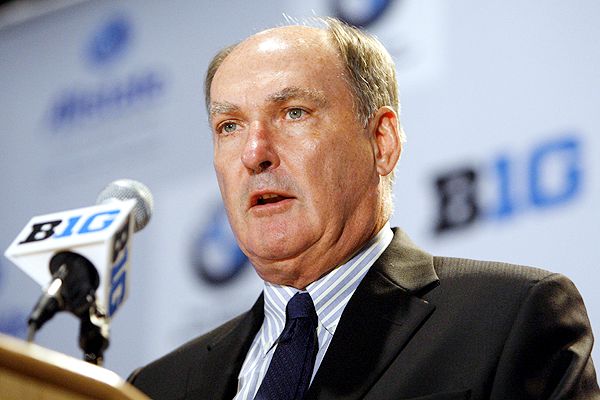Jim Delany Fires a Warning Shot
Posted by Alex Moscoso (@AlexPMoscoso) on November 1st, 2013Yesterday at Big Ten media day in Chicago, commissioner Jim Delany made some interesting comments. He advocated for schools from power conferences to exercise more autonomy in a restructured NCAA. In his view, this would eliminate the “existential threats” to college sports. Without question, these comments are a direct shot at smaller Division I schools, and they bring to the surface an issue that’s been bubbling up for years. The big programs from power conferences have grown increasingly frustrated with those schools dictating what they can and cannot do with respect to the services they can provide to scholarship athletes. Delany, the most outspoken of all the power conference brokers, is trying to big time them back into their place.
The relationship between the bigger and smaller schools under the NCAA umbrella has been rocky, and the reason for it comes down to a key question. Should a program like Ohio State play under the same regulations and guidelines as a program like Ball State? In 2011, Ohio State’s athletic department brought in $142 million in revenue while Ball State brought in $21 million. These programs operate on completely different levels, yet both programs must follow the same NCAA guidelines. This includes the types of perks each program can provide to its players. For example, Ohio State cannot just decide on its own to provide its players with catered meals every day; it needs the smaller schools in the organization to also agree to it. But since schools like Ball State cannot afford to provide their players with catered meals every day, they band together in voting blocs and reject such proposals with the clear reasoning that it would create an unfair recruiting advantage for the bigger schools. The catered meal example is a somewhat insignificant one, but these small items multiplied dozens of times over can start to add up.
The big programs have made it clear that they are continually frustrated by the voting power of the rest of Division I and have discussed one day leaving the NCAA to form their own organization. If the power conferences were ever to disband from the NCAA, it would forever change college basketball. In that scenario, they would run their own postseason events, which could possibly mean a basketball tournament with no Florida Gulf Coast, Gonzaga, VCU, or the rest, robbing March of so much of its Cinderella magic. Delany’s comments yesterday were a warning to the smaller schools: Stop holding us back or risk being shut out completely. If you enjoy college sports as they’re currently constructed, we should all hope that the power conferences figure out a way to share the wealth or risk a future where the college basketball postseason might look a lot different than what we’ve come to love.










































